A babe is in the Indian's
hut,
A babe but lately born,
And yet the dwelling is not
shut,
At noon, or night, or morn,
But heat and cold, and light
and air,
The little stranger learns
to bear.
And daily in the stream or
flood
The tender child is bathed,
And daily to a piece of wood,
With bandage closely
swathed;
That spreading joint, or
crooked limb,
May not deform and trouble
him.
And when the mother goes
abroad,
And bears her infant young,
Still fastened to this piece
of board,
Upon her back 'tis hung;
Through summer's heat and
winter's snow,
For many a mile they travel
so.
Sometimes in basket sleeping
laid,
'Twas hung upon a tree,
The wind a lulling music
made,
And rock'd it merrily;
Hard by, her work the mother
plied,
And listened when it waked
or cried.
She made no garment thick or
thin,
Its person to array;
No cap was tied beneath its
chin,
Bedeck'd with ribbons gay,
And not a single frill of
lace,
Was round the Indian baby's
face.
And yet it eat, and drank
and slept,
And grew as fast and strong,
As if in splendid chamber
kept,
By servants tended long,
Perhaps the little Indian,
too,
As mindful of its parents
grew.
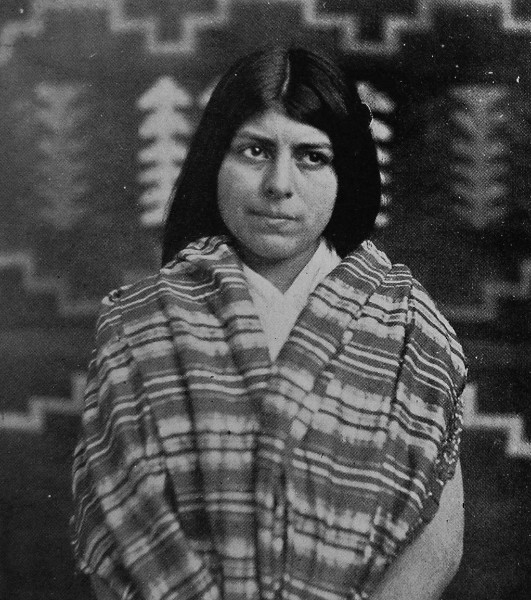
For as we read, of lash or
thong
But little use was made,
And yet the aged, by the young,
Were reverenced and obeyed;
And in this day 'twere not
amiss,
For all to heed and copy
this.
To the forest fine, where
the oak and pine
With spreading branches
grew,
In days of old, came the
Indian bold,
Who wanted a canoe.
When his practised eyes, a
tree espies
Of proper size and strength,
With ready blow he lays it
low,
And hews to proper length.
All this is done with axe of
stone,
And arm of labor stout;
But 'twill now require the
aid of fire,
The trunk to hollow out.
With careful hands the
glowing brands
On the russet bark are laid,
And watched and turned, till
the core is burn'd,
And the needful hollow made.
His boat thus made, from the
forest's shade
The Indian bears with pride,
And with paddle good of
oaken wood,
Impels it o'er the tide.
Unlike indeed, in form and
speed,
Was the Indian's poor canoe,
To the pinnace gay, which
now each bay
And harbor brings to view.
And every lad may well be
glad
As he sails in vessel trim,
That this early day hath
passed away,
And a better risen for him,
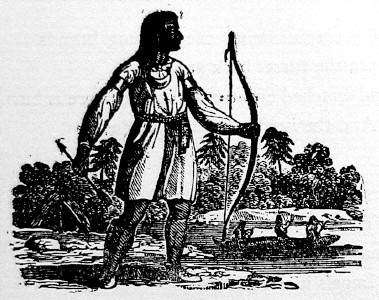
THE HUNTER
His food was scant, his
venison gone,
And he must hunt perchance
all day,
E'er he his hunger can
allay.
His bow the hunter closely
eyes,
Its string of twisted sinews
tries;
Since steel or iron he had none,
His arrow heads were
sharpened stone.
With these equipped, and
round him tied
His garments of the dun
deer's hide,
He from his wigwam's opening
came,
With steps erect and sturdy
frame.
True to his purpose, all the
day
He ranged the forest for his
prey,
Nor sought alone the
antler'd deer
And tender fawn to make him
cheer.
The hunter knew how sweet
and fresh,
Was rabbit's and was
squirrel's flesh;
Nor lightly was esteemed by
him,
The woodchuck and the
weasel's limb.
The sun was in the western
sky,
His children with impatient
eye,
Had long looked out, in
hopes to greet
The hunter's home returning
feet.
His form is seen, and shout
and whoop
Come loudly from the merry
troop,
For meat beside, he seldom
fails
To bring them fox and
squirrel's tails.
Now nearer come, his
gladsome squaw
A fresh supply of venison
saw;
For one fine deer, with
smaller game,
The victims of the chase
became.
Now placed within the
wigwam's bounds,
The impatient group the food
surrounds,
And the brisk wife prepares
to dress,
In fashion rude her evening
mess.
You who would learn the way
they took,
With neither pot nor pan to
cook,
May read the next-ensuing
verses,
Which Indian cookery
rehearses.
No little girl or boy hath
guess'd
The process or the art,
By which the early Indians
dress'd
And cut their meat apart;
Since neither knife, nor
spoon, nor fork,
Had they to aid them in
their work.
A piece of flint or
sharpen'd shell,
The place of knife supplied,
And answered every purpose
well,
To free it from the hide,
To clear the entrails,
scrape the hair,
And make the carcass clean
and fair.
Then in the earth a pit was
made,
To hold the fish or game,
With stones at side and
bottom laid,
An oven soon became:
No better did their wants
require
And here they lighted up a
fire.
From this when gained
sufficient heat,
The glowing coals were dug.
And here deposited the meat,
With leaves encompass'd
snug;
With heated stones 'twas
covered up,
Till time to breakfast,
dine, or sup.
But how without a pot to
boil,
Must puzzle Indian wit;
A stone they sought, and mighty
toil
A hollow made in it,
And water got its warmth
alone
From heated pebbles in it
thrown.
And other pebbles burning
hot,
Kept up the boiling heat,
Within this strangely
fashioned pot,
And here they cooked their
meat;
Not over nice, for Indian
eye
Beheld not dainty cookery.
And fish well broiled on
embers red,
The Indians often saw,
And shell-fish from their
rocky bed,
Were eaten roast and raw:
Yet poor the viands Indians
prized
Would seem to people
civlized.
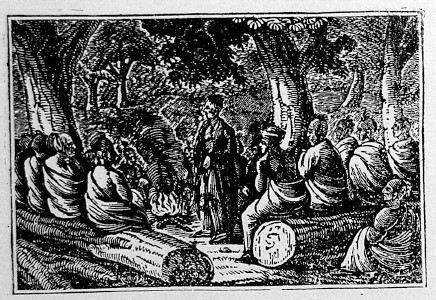
THE WARRIOR
Bade all his brave warriors
be ready for fight;
Some neighboring tribe had
his people annoyed,
Their wigwams had plundered,
or corn had destroyed.
Then up rose each warrior,
his tomahawk tried,
His bow and his arrows most
carefully eyed,
And soon to the gathering
came in a fierce throng,
To join in the war dance and
sing the war song.
The song and the dance, how
unlike was the tune
And the motion, to that of
the hall and saloon;
They sung in wild screams
how their foes they'd engage,
And the dance was but
gestures of fury and rage.
And then with her paint an
old woman came in,
To daub every warrior from
forehead to chin,
They imagined their foemen
would view them with dread,
When each was made hideous
with black, white and red.
These colors the matron at
random disposes,
On cheeks and on foreheads,
on eyelids and noses,
Their hair long and lank in
a close knot she gathers,
And sticks in the centre a
bunch of gay feathers.
A small stock of corn which
the women must parch,
Is all the provision they
make for their march;
And with little farewell to
wife, parent or daughter,
The war-party goes on its
errand of slaughter.
I follow them not where the
battle arose,
I tell not of scalped or of
tomahawk'd foes:
The deeds of their arms are
too sad for my story,
For war they call'd
pleasure, and cruelty glory.
"I do not like this
frock of mine,"
Said little Ellen to her
mother;
"The girls at school are dress'd so fine,
I wish you would get me
another.
"And will you get one
very gay,
And a new bonnet trim'd with
lace,
That I may look as smart as
they,
Nor be ashamed to show my
face!"
Her mother answered her,
"My dear Your clothes,
I'm sure, are very good,
Nor would I wish you to
appear
So fine and gaudy if you
could.
"But if you'll love
your studies, child,
I'll buy you many pretty books;
And be good-natur'd, kind
and mild,
And all your friends will
like your looks,"
We love the town in wintry
weather,
Here houses are all close
together,
When not a single leaf of
green,
Is in the fields or gardens
seen;
But when summer comes so
warm,
What so pleasant as a Farm,
O how children love to play,
Where the men are raking
hay;
Now with baskets see them
go,
Where the grapes or berries
grow.
In the orchard next you'll
see
Them picking fruit from tree
to tree,
What lovely apples, pears
and plums,
Hang on the trees when
autumn comes.
Little friends who yet have
left
Grandmothers whom age
endears;
Little friends who are
bereft
Of this joy of early years,
Unto me your ears incline,
While I fondly tell of mine.
Memory yet delights to view,
Hours of infantine delight,
When her high-heeled velvet
shoe,
With its silver buckle
bright,
Gave her grandchild greater
joy,
Than the most expensive toy.
Half my joy cannot be told,
When from pockets deep and
wide,
Treasures new and treasures
old,
Lay commingled side by side,
All my admiration won,
E'en her worsted pin
cushion.
Other charms, as years went
by,
In this lov'd one could I see;
Soon I noticed that her eye
Sent her fondest glance to
me;
None like her had healing
skill,
When her little girl was
ill.
Then her cap of cambric fine
Cover'd locks as white as
snow,
These my fingers oft would
twine,
While her neck they
compass'd slow,
Every golden bead to tell,
Though I knew their number
well.
Others painted for my
choice,
Good and evil deed and
thought,
But my own grandmother's
voice,
To my heart their lessons
brought;
For that heart had confidence,
In her wisdom, love, and
sense.
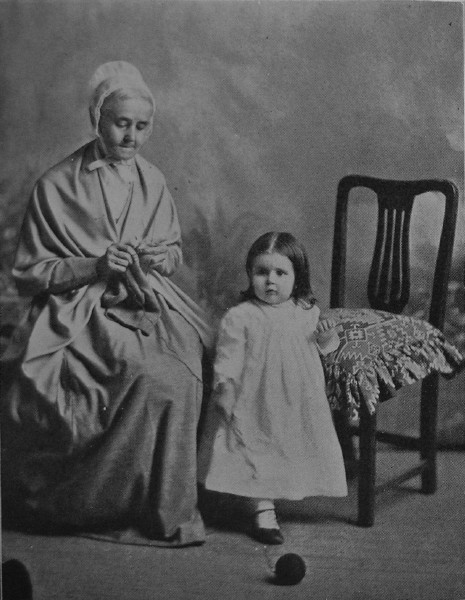
I have seen since I was
young,
Many a year of care and
strife;
But the precepts of her
tongue,
And the lessons of her life,
Still have power my feet to
stay,
From a tempting evil way.
Since the time that she was
born,
More than eighty years had
passed,
Like a shock of ripen'd
corn,
To the grave she sunk at
last,
And we humbly trust found
rest,
With the spirits of the
blest.
'Tis twilight when the
glorious sun,
Has left his place on high,
When evening shades have
just begun
To steal along the sky.
The swallow leaves the
fields of air,
The busy bee the flower,
And busier man is glad to
share,
The quiet of the hour.
Tho' small in size, the
cricket tries,
His voice so shrill and
strong,
And many a frog from pond
and bog,
Sends forth its croaking
song.
'Tis now the time when
children dear
May rest their wearied
limbs,
And as the time for bed draws near,
Repeat their evening hymns.
Too dark to read, if now
should fail
Their little stock of verse,
May listen to some pleasant
tale,
Which others can rehearse.
For one dear boy, who loved
the power
Of twilight's quiet time,
A friend belov'd, in leisure
hour
Composed this book of rhyme.
For at the close of every
day,
Did Thomas seek this friend,
To ask for some amusing lay,
Which she had heard or
penn'd.
If good and gentle was the
boy,
Her arms she round him
threw,
And from her memory drew
with joy,
Her stories old and new.
But if departing from the
right,
His deeds had been amiss,
No twilight tale had he that
night,
Or pleasant parting kiss.
And here behold in fair
array,
A part of this her work,
Printed and sold by Mahlon
Day,
Who lives in famed New-York.
In Pearl-street stands his
handsome store,
The number we affix,
In figures marked above the
door,
Three hundred seventy-six.
THE INDIAN AND THE PLANTER
By the door of his house a
planter stood,
In fair Virginia's clime,
When the setting sun had
tinged the wood
With its golden hue sublime.
The lands of this planter were
broadly spread,
He lacked not gold or gear,
And his house had plenty of
meat and bread
To make them goodly cheer.
An Indian came from the
forest deep,
A hunter in weary plight,
Who in humble accents asked
to sleep
'Neath the planter's roof
that night.
To the Indian's need he took
no heed,
But forbade his longer stay:
"Then give me," he
said, "but a crust of bread,
"And I'll travel on my
way."
In wrath the planter this
denied,
Forgetting the golden rule;
"Then give me, for
mercy's sake," he cried,
"A cup of water cool.
"All day I have
travel'd o'er fen and bog,
"In chase of the
bounding deer;"
"Away," cried the
planter, "you Indian dog,
"For you shall have
nothing here."
The Indian turned to his
distant home,
Though hungry and travel
sore,
And the planter enter'd his
goodly dome,
Nor thought of the Indian
more.
When the leaves were sere,
to chase the deer,
This self same planter went,
And bewildered stood, in a
dismal wood,
When the day was fully
spent.
He had lost his way in the
chase that clay,
And in vain to find it
tried,
When a glimmering light fell
on his sight,
From a wigwam close beside.
He thither ran, and a savage
man
Received him as a guest;
He brought him cheer, the
flesh of deer,
And gave him of the best.
Then kindly spread for the
white man's bed,
His softest skins beside,
And at break of day, through
the forest way,
Went forth to be his guide.
At the forest's verge, did
the planter urge,
His service to have paid,
But the savage bold refused
his gold,
And thus to the white man said:
"I came of late to the
white man's gate,
"And weary and faint
was I,
"Yet neither meat, nor
water sweet,
"Did the Indian's wants supply.
"Again should he come
to the white man's home,
"My service let him
pay,
"Nor say again to the
fainting man,
"You 'Indian dog,
away!' "
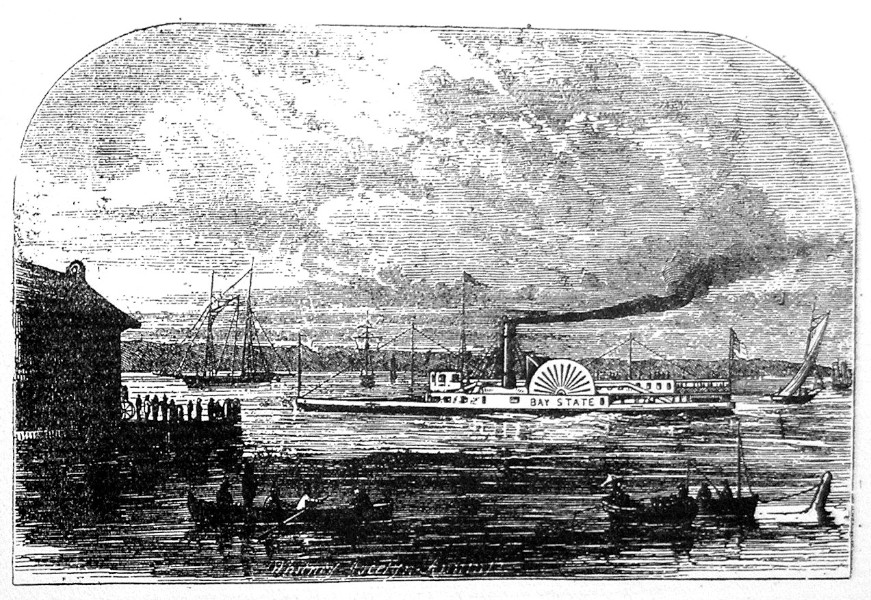
THE ACCIDENT
Said Robert to some idle
boys,
"We will see all the
passengers land on the wharf,
And hear all the clatter and
noise."
Away they all ran, with Bob
at their head,
Whom his parents thought
safe in the school;
Oh! how 't would have
griev'd them to know that instead,
He was idling and playing
the fool.
So speedily over the
Steam-boat he went,
He tri'd every passage and
stair,
Through this room and that
room his footsteps he bent,
For nobody knew he was
there.
And when the machinery came
in his view
Of this thing and that thing
he feels
And thought not of danger,
for little lie knew
The terrible power of the
wheels.
But as he was turning from
what he had seen,
To view something else that
was near,
His foot was caught fast in
the dreadful machine,
As it rolled in its rapid
career.
He screamed till they heard
him and stopp'd the great wheel,
Then up to the deck he was
borne,
But sad to relate, from his
toe to his heel
Was dreadfully mangled and
torn.
The poor little fellow was
put in the chair,
And conveyed to his own father's door;
A surgeon was sent for, who
dress'd it with care,
But the blood ran in streams
to the floor.
Long he lay on his bed,
where he suffer'd so much,
That his folly he deeply
deplores,
And through all his life
must he walk with a crutch,
With which he just hobbles
out doors.
Little boys, have a care,
and keep close to your homes
Nor pleasures forbidden
pursue,
Not only yourselves, but
when punishment comes,
All who love you must suffer
with you.
Little boys, have a care,
'tis our Father in Heaven,
Who has bless'd us with life
and with limb,
And to carelessly trifle with what he hath given,
Is surely displeasing to
him.
A LITTLE BOY WHO BROKE HIS
ARM
A little happy boy, one day,
Jump'd up into a chair to
play,
Not thinking any harm;
When, O how sad! I grieve to
tell,
Down came the chair, and
William fell
And broke his little arm.
Poor little fellow, how he
cried,
His mother grieved, and all
beside
Who heard what had been
done:
A tedious time he had to
wait,
Until the doctor set it
straight,
And put the splinters on.
His mother held him all the
while,
And pleased was she to see
him smile,
When all the pain was o'er,
When on his bed he sweetly
slept,
'Twas then she sat her down
and wept,
Till she could weep no more.
He suffer'd much before
'twas set,
But still he did not scream
and fret,
As many would have done:
All lov'd him more than words
can tell,
Because he did behave so
well,
With such a broken bone.
His father, aunts, and
cousins too,
All brought him sweetmeats
not a few,
He was so good a child:
Then little children don't
you see,
How happy 'tis for one to be
So gentle, and so mild.
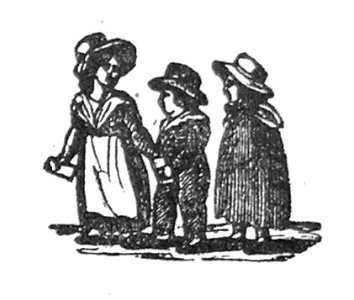
"A HAPPY NEW YEAR"
I wish you all a happy year!
The most industrious, it is
true,
Will always be the happiest
too—
If little fingers fast will
fly,
There'll be no time to fret
and sigh;
And if the head have full
employ,
The heart will always dance
with joy.
If good and active, children
dear,
You're sure to have a happy
year.
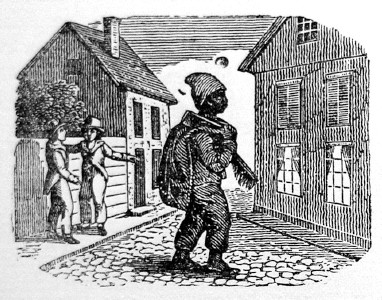
THE CHIMNEY SWEEP
With sooty clothes tatter'd and torn?
An old cap on his head, but
no shoes on his feet,
O surely he looks most
forlorn!
O why don't his mother take
off his old clothes,
And wash him and dress him
up neat?
He scares all the children wherever he goes,
A screaming so loud in the
street.
O don't be afraid of the
poor little boy,
Because he is ragged and
black;
I dare say his mother
beholds him with joy,
And calls him her poor
little Jack.
He's oblig'd to sweep
chimneys to earn her some bread,
Because she is feeble and
poor,
With the money he earns all
the children are fed,
Then Jack's a good boy I am
sure.
And he has no father, he
died long ago,
When Jack was a very small
boy:
O then do not wonder to see
him look so,
And have not a better
employ.
And boys should not call him
a dunce and a fool,
Because the poor Sweep-O
could not go to school.
Note,—Little colored boys in
cities used to find employment sweeping out chimneys, They went about the
streets with their brushes calling out "Sweep-O, Sweep-O," much the
same as newsboys now call out their papers.
For those who have fathers
and mothers to feel,
A grief in their follies, a
joy in their weal,
But sometimes forget the
obedience their due,
This story is written as sad
as 'tis true.
A kind hearted Lady, a
friend to the poor,
One bitter cold morning
beheld at her door,
A poor little fellow, his
jacket was thin,
And the rags called his
trowsers scarce cover'd his skin.
She spoke to the child in a
compassionate tone,
And found he subsisted by
begging alone,
He early was forced for his
living to strive,
For of years he yet wanted
some months to be five.
Yet bright and intelligent
Willy appear'd,
Surpassing far many more
tenderly rear'd;
His father, a soldier, was
gone from the state,
And three little children
were left with his mate.
This mother of Willy's, the
neighbors all thought,
Spent a good deal more money
in gin than she ought,
While he and his sister
asked victuals and wood,
The poor little baby made
out as it could.
When marked by the blows
which her anger inspired,
Thus Willy excused her to
all that inquired:
Mother said I was saucy, and
missing the place
Where her hand meant to
strike me, it fell on my face.
His kind benefactress did
all that she could,
She fed him, she clothed
him, advised him for good,
He must beg for his mother
as long as 'tis cool,
But when the spring comes
she will send him to school.
But you who have fathers and
mothers to feel,
A grief in your follies, and
joy in your weal,
Remember, I pray you, how
much is their due,
Lest poor little Will should
be better than you.
|
|

